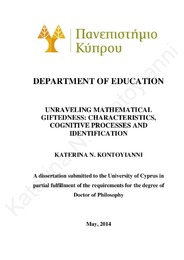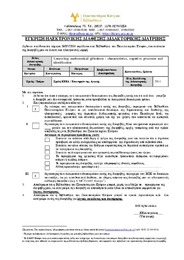| dc.contributor.advisor | Christou, Constantinos | en |
| dc.contributor.author | Kontoyianni, Katerina N. | en |
| dc.coverage.spatial | Κύπρος | el |
| dc.coverage.spatial | Cyprus | en |
| dc.creator | Kontoyianni, Katerina N. | en |
| dc.date.accessioned | 2014-08-27T05:12:10Z | |
| dc.date.accessioned | 2017-08-03T09:39:51Z | |
| dc.date.available | 2014-08-27T05:12:10Z | |
| dc.date.available | 2017-08-03T09:39:51Z | |
| dc.date.issued | 2014-05 | |
| dc.date.submitted | 2014-05-26 | |
| dc.identifier.uri | https://gnosis.library.ucy.ac.cy/handle/7/39220 | en |
| dc.description | Includes bibliographical references. | en |
| dc.description | Number of sources in the bibliography: 319 | en |
| dc.description | Thesis (Ph. D.) -- University of Cyprus, Faculty of Social Sciences and Education, Department of Education, 2014. | en |
| dc.description | The University of Cyprus Library holds the printed form of the thesis. | en |
| dc.description.abstract | O σκοπός της εργασίας ήταν η ανάπτυξη ενός θεωρητικού μοντέλου για την περιγραφή της χαρισματικότητας στα μαθηματικά σκιαγραφώντας τις ικανότητες, τις γνωστικές και υπεργνωστικές διεργασίες που εφαρμόζουν οι χαρισματικοί μαθητές και η εισήγηση μίας διαδικασίας αναγνώρισης η οποία να διακρίνει χαρισματικούς μαθητές στα μαθηματικά, Ε’ και Στ’ Δημοτικού.
Στην έρευνα συμμετείχαν 551 μαθητές, στους οποίους χορηγήθηκαν δύο εργαλεία. Το πρώτο εργαλείο μετρούσε τις μαθηματικές ικανότητες που σχετίζονται με τη χαρισματικότητα. Με βάση την επίδοσή τους, τριάντα πέντε μαθητές επιλέγηκαν να λάβουν μέρος στην επόμενη φάση, κατά την οποία χορηγήθηκε το δεύτερο εργαλείο το οποίο περιείχε μαθηματικά έργα που αποτελούσαν πρόκληση για τους μαθητές. Σε αυτή τη φάση, πραγματοποιήθηκε ατομική παρατήρηση για τη διερεύνηση, ανάλυση και διασαφήνιση των γνωστικών και υπεργνωστικών διεργασιών που εφαρμόζουν οι μαθητές σε περιστάσεις επίλυσης προβλήματος.
Τα αποτελέσματα της έρευνας επιβεβαίωσαν την πολυδιάστατη οντότητα της χαρισματικότητας στα μαθηματικά, ως αμάλγαμα τριών παραγόντων: (α) μαθηματικές ικανότητες, (β) γνωστικές και (γ) υπεργνωστικές διεργασίες. Κάθε παράγοντας αποτελείται από περαιτέρω συνιστώσες που σχετίζονται με τη χαρισματικότητα στα μαθηματικά. Συγκεκριμένα, η ικανότητα που αφορά σχέσεις αριθμών, η χωρική ικανότητα, η ικανότητα που αφορά σε σχέσεις εγκλεισμού και η δημιουργική ικανότητα συνιστούν τον παράγοντα των μαθηματικών ικανοτήτων. Τα αποτελέσματα της εργασίας έδειξαν την ύπαρξη τριών κατηγοριών γνωστικών διεργασιών που σχετίζονται με τη μαθηματική χαρισματικότητα, οι οποίες διαφαίνονται κατά τη διάρκεια της επίλυσης προβλήματος. Αυτές αφορούν τη διαμόρφωση γενικεύσεων, την ευελιξία των νοερών διαδικασιών και τη δημιουργική σκέψη. Η κατηγορία της ευελιξίας των νοερών διεργασιών, εκτείνεται περαιτέρω στην παραγωγή πολλαπλών μαθηματικών λύσεων, το συλλογισμό σε κύκλους, τον ταυτόχρονο χειρισμό ποικιλίας μαθηματικών σχέσεων, την ευχέρεια με βάση την πρακτικότητα, τη συντόμευση της διαδικασίας του μαθηματικού συλλογισμού και την οικονομία σκέψης και τέλος την αντιστρεψιμότητα των νοερών διαδικασιών. Η τρίτη ευρεία κατηγορία της δημιουργικής σκέψης στα μαθηματικά περιλαμβάνει πέντε διεργασίες: την κατασκευή μαθηματικών διασυνδέσεων, τη δημιουργική χωρική ικανότητα, την ολιστική και αναλυτική αντίληψη των χωρικών πληροφοριών, την επικέντρωση τόσο στο προϊόν όσο και στη διαδικασία και τη δημιουργικότητα σε σχέση με τα προϊόντα και τις διαδικασίες. Τα αποτελέσματα αυτής της εργασίας έδειξαν ότι οι γνωστικές διεργασίες σχετίζονται μεταξύ τους. Επίσης, η εργασία έδειξε ότι κατά την επίλυση προβλήματος, οι χαρισματικοί μαθητές εκδηλώνουν δύο βασικές υπεργνωστικές διεργασίες, συγκεκριμένα, (α) αυτορρύθμιση και (β) δέσμευση στο έργο, επιμονή και αυτοπεποίθηση.
Τέλος, τα ευρήματα υποδεικνύουν ότι η αναγνώριση της χαρισματικότητας στα μαθηματικά είναι δυνατή μέσα από μια διαδικασία αναγνώρισης δύο φάσεων, συλλέγοντας ποσοτικά και ποιοτικά δεδομένα και χρησιμοποιώντας προβλήματα για την ανάδειξη της ποιότητας της σκέψης των χαρισματικών μαθητών. Κατά συνέπεια, η εργασία αξιολόγησε εμπειρικά μια διαδικασία αναγνώρισης με στόχο την εκδήλωση του μαθηματικού δυναμικού μαθητών Ε’ και Στ’ Δημοτικού. Η διαδικασία επιτρέπει την εξέταση και περιγραφή των ικανοτήτων, των γνωστικών και υπεργνωστικών διαδικασιών που χρησιμοποιούν οι χαρισματικοί μαθητές στα μαθηματικά κατά την επίλυση ανεξοικείωτων μαθηματικών προβλημάτων. H διαδικασία αναγνώρισης υποδεικνύει επίσης ότι η παρατήρηση των μαθητών κατά τη διαδικασία επίλυσης προβλήματος αποτελεί ένα από τους πιο αποτελεσματικούς τρόπους ανίχνευσης των χαρακτηριστικών των μαθητών και επομένως, συλλαμβάνει την εκδήλωση της μαθηματικής χαρισματικότητας και του αντίστοιχου δυναμικού. | el |
| dc.description.abstract | The purpose of this study was to develop a theoretical model that describes mathematical giftedness outlining the abilities, cognitive and hypercognitive processes of gifted students in mathematics and to suggest a corresponding identification process that may distinguish mathematically gifted students in 5th and 6th grades of elementary school.
Five hundred and fifty nine students participated in the study. Two instruments were administered. The first test served as a screening instrument and measured students’ mathematical abilities related to giftedness in mathematics. Based on their performance, thirty five students were selected to participate in the next stage, during which the second test containing challenging mathematical tasks was administered. During this stage, individual observations took place to investigate, analyse and elucidate the cognitive and hypercognitive processes of gifted students employed during problem solving.
The results of the study confirmed the multidimensional construct of mathematical giftedness, as an amalgamation of three factors: (a) mathematical abilities, (b) cognitive processes and (c) hypercognitive processes. Each aspect consists of further components related to giftedness in mathematics. Namely, ability in number relations, spatial ability, ability in inclusion relations and creative ability comprise the factor of mathematical abilities. The results of the study showed the existence of three categories of cognitive processes related to giftedness in mathematics, evident through problem solving; articulation of generalizations, flexibility of mental processes and creative thinking. The category of flexibility of mental processes, is further expanded in specific sub-processes; generation of multiple mathematical solutions, reasoning in cycles, control of multiple mathematical relationships at once, fluency for expediency, curtailment of the process of mathematical reasoning and economical thinking and lastly reversibility of mental processes. The third greater category of creative thinking in mathematics involves five processes; namely, construction of mathematical connections, creative spatial ability, holistic and analytic perception of spatial information, focus on product but also on the process and originality in terms of products and processes. The results of this study showed that the cognitive processes are interrelated rather than independent. In addition, the results of the study described the hypercognitive processes of gifted students in mathematics, employed during problem solving situations. These processes are (a) self-regulation and (b) task commitment, perseverance and confidence.
Finally, the findings of the study suggest that it is possible to identify giftedness in mathematics following a two phase identification process, collecting both quantitative and qualitative evidence and using carefully designed mathematical tasks to reveal gifted students’ quality of thinking. Hence, the study formed and empirically assessed an identification process of giftedness in mathematics, aiming to allow the manifestation of mathematical potential in students attending 5th and 6th grade. The identification process, allows to examine and describe the nature of the abilities, problem solving reasoning processes that mathematically gifted students use as they engage in solving non-routine mathematical problems, as well as hypercognitive processes employed. It also indicates that observing students during rich problem solving consists of one of the most efficient ways to trace these characteristics and thus capture the manifestation of mathematical giftedness and potential. | en |
| dc.format.extent | xvi, 249,[70] p. : tables ; 30 cm. | en |
| dc.language.iso | eng | en |
| dc.publisher | Πανεπιστήμιο Κύπρου, Σχολή Κοινωνικών Επιστημών και Επιστημών Αγωγής / University of Cyprus, Faculty of Social Sciences and Education | |
| dc.rights | info:eu-repo/semantics/openAccess | en |
| dc.rights | Open Access | en |
| dc.subject.lcsh | Gifted children Identification Case studies | en |
| dc.subject.lcsh | Gifted children Education Cyprus Mathematics | en |
| dc.subject.lcsh | Mathematical ability in children | en |
| dc.subject.lcsh | Mathematics Study and teaching (Elementary) Cyprus Case studies | en |
| dc.subject.lcsh | Educational tests and measurements | en |
| dc.subject.lcsh | Cognition in children | en |
| dc.title | Unraveling mathematical giftedness : characteristics, cognitive processes and identification | en |
| dc.title.alternative | Διασαφηνίζοντας τη μαθηματική χαρισματικότητα: χαρακτηριστικά, γνωστικές διαδικασίες και αναγνώριση | el |
| dc.type | info:eu-repo/semantics/doctoralThesis | en |
| dc.contributor.committeemember | Xρίστου, Kωνσταντίνος | el |
| dc.contributor.committeemember | Πίττα-Πανταζή, Δήμητρα | el |
| dc.contributor.committeemember | Γαγάτσης, Αθανάσιος | el |
| dc.contributor.committeemember | Σακονίδης, Χαράλαμπος | el |
| dc.contributor.committeemember | Τζεκάκη, Μαριάννα | el |
| dc.contributor.committeemember | Christou, Constantinos | en |
| dc.contributor.committeemember | Pitta-Pantazi, Demetra | en |
| dc.contributor.committeemember | Gagatsis, Athanasios | en |
| dc.contributor.committeemember | Sakonides, Charalambos | en |
| dc.contributor.committeemember | Tzekaki, Marianna | en |
| dc.contributor.department | Πανεπιστήμιο Κύπρου, Σχολή Κοινωνικών Επιστημών και Επιστημών Αγωγής, Τμήμα Επιστημών της Αγωγής | el |
| dc.contributor.department | University of Cyprus, Faculty of Social Sciences and Education, Department of Education | en |
| dc.subject.uncontrolledterm | ΧΑΡΙΣΜΑΤΙΚΟΤΗΤΑ | el |
| dc.subject.uncontrolledterm | ΜΑΘΗΜΑΤΙΚΑ | el |
| dc.subject.uncontrolledterm | ΓΝΩΣΤΙΚΕΣ ΔΙΑΔΙΚΑΣΙΕΣ | el |
| dc.subject.uncontrolledterm | ΥΠΕΡΓΝΩΣΤΙΚΕΣ ΔΙΑΔΙΚΑΣΙΕΣ | el |
| dc.subject.uncontrolledterm | ΑΝΑΓΝΩΡΙΣΗ | el |
| dc.subject.uncontrolledterm | GIFTEDNESS | en |
| dc.subject.uncontrolledterm | MATHEMATICS | en |
| dc.subject.uncontrolledterm | COGNITIVE PROCESSES | en |
| dc.subject.uncontrolledterm | HYPERCOGNITIVE PROCESSES | en |
| dc.subject.uncontrolledterm | IDENTIFICATION | en |
| dc.identifier.lc | QA11.2.K66 2014 | en |
| dc.author.faculty | Σχολή Κοινωνικών Επιστημών και Επιστημών Αγωγής / Faculty of Social Sciences and Education | |
| dc.author.department | Τμήμα Επιστημών της Αγωγής / Department of Education | |
| dc.type.uhtype | Doctoral Thesis | en |
| dc.rights.embargodate | 2015-05-26 | |
| dc.contributor.orcid | Christou, Constantinos [0000-0002-5901-5931] | |



